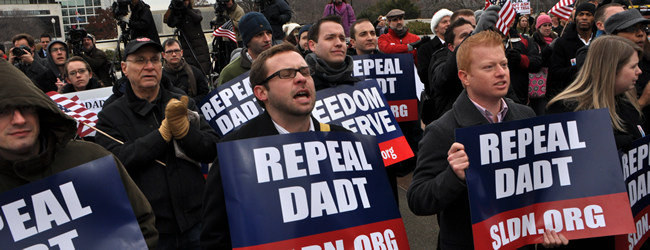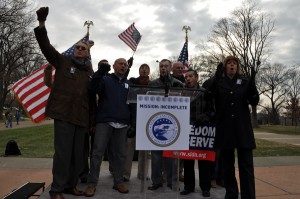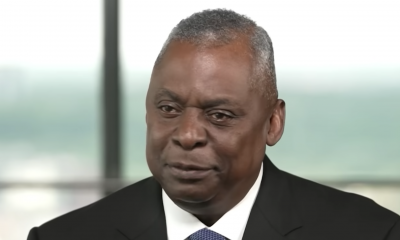National
‘Don’t Go Home!’ until ‘Don’t Ask’ is done
Demonstrators demand Senators extend session

Supporters of open service in the U.S. military rallied on Capitol Hill Friday to urge the Senate to stay in session for as long as needed until lawmakers repeal “Don’t Ask, Don’t Tell.”
Braving the December cold, around 100 participants gathered near the U.S. Capitol at the Upper Senate Park for the event, which was organized by the Servicemembers Legal Defense Network.
Those in attendance shouted the refrain “Don’t Go Home!” as they demanded that lawmakers continue work on Capitol Hill until “Don’t Ask, Don’t Tell” is repealed.
The rally comes in the wake of a devastating defeat that supporters of “Don’t Ask, Don’t Tell” repeal suffered on Thursday when the Senate failed to move ahead with major defense legislation containing repeal language by a vote of 57-40, three votes short of the 60-vote threshold necessary to end a filibuster.
Aubrey Sarvis, executive director of the Servicemembers Legal Defense Network, told the crowd the vote represented a setback, but said supporters of repeal have “reported back for duty.”
“In this lame duck, we speak everyday for all LGBT service members as they fight for our freedom,” Sarvis said. “In this Congress, we raise our voices as one and say, ‘Senators, kill this law, kill this law before you go home!'”
A number of veterans and current service members — gay and straight — addressed the rally and called for an end to the military’s gay ban.
Mike Almy, a gay former Air Force communications officer who was discharged in 2008 under “Don’t Ask, Don’t Tell,” also called on the Senate to stay in session until work is done on lifting the military’s gay ban.
“The Senate wants … to go home to their families and not do their duties and sit by warm fireplaces comfortably in their homes for Christmas while the work remains unfinished,” Almy said. “If I can serve overseas in harm’s way for four Christmases defending our nation, the Senate can certainly do the same.”
Senate Majority Leader Harry Reid (D-Nev.) has set Dec. 17 as the target date for adjournment for the Senate, although some lawmakers, including Sens. Joseph Lieberman (I-Conn.) and Mark Udall (D-Colo.), have said they’re willing to stay in session through the week before Christmas to repeal “Don’t Ask, Don’t Tell.”
Ret. Maj. Gen. Dennis Laich, who’s straight served in the Army for 35 years, said repeal of “Don’t Ask, Don’t Tell” is needed because the ban compromises the integrity of the U.S. military.
“‘Don’t Ask, Don’t Tell’ acknowledges that gays and lesbians serve in our military, but pretends they’re not there,” he said. “It destroys the values of that institution and on which it is based.”
Should the Senate not repeal “Don’t Ask, Don’t Tell,” Laich predicted what he called a “Spartacus moment” in which the estimated 66,000 gay and lesbian people serving in the military would declare their sexual orientations under the current law.
“How much does it cost to process the discharge of 66,000 service members?” Laich said. “How much does it cost to recruit and train their replacements? How long will it take to recruit and train those replacements? And how vulnerable will America be during this self-imposed national security crisis?”
Speakers at the rally had particularly strong words for senators who were among the “no” votes on Thursday preventing the “Don’t Ask, Don’t Tell” legislation from coming to the Senate floor.
Almy, an Ohio native whose family still lives in the state, said he was particularly disappointed in Sen. George Voinovich’s (R-Ohio) decision to vote against the legislation. The senator was considered a swing vote on moving forward with “Don’t Ask, Don’t Tell.”
“Yesterday, you shamed me with your vote as well as the rest of the Ohio veterans,” Almy said. “This is going to be your legacy. You are on the wrong side of history here Sen. Voinovich. I call on you here specifically to stay here in Washington and not leave.”
Two speakers who hailed from West Virginia also had harsh words for Sen. Joe Manchin (D-W.Va.), the only Democrat who voted against the motion to proceed Thursday on “Don’t Ask, Don’t Tell” repeal legislation.
Sgt. Jared Towner, a straight member of the West Virginia Army National Guard, said the “very, very established progressive youth element” in his state is disappointed in Manchin for his vote and could decline to back him when he’s next up for election in two years.
“We are the people that are going to be there — or we are the people that are not going to be there — in 2012,” Towner said. “You have to be there for us.”
Former Army Sgt. Pepe Johnson, a field artilleryman and Clarksburg, W.Va., native who was discharged under “Don’t Ask, Don’t Tell” in 2003, said he was “embarassed” because Manchin “decided to be a lone ranger” and vote against repeal.
“He said he’d only been in office for three weeks, so he didn’t have a chance to hear from the people of West Virginia,” Johnson said. “Well, Joe Manchin, if you can’t hear now, you better get a hearing aide!”
Many participants echoed the general tenor of the rally that Congress should stay in session for the time that’s needed to repeal “Don’t Ask, Don’t Tell” before going home.
Toby Quaranta, 25 and a gay D.C. resident, said he participated in the rally because he wants “people everywhere to know” that supporters of “Don’t Ask, Don’t Tell” repeal don’t want lawmakers to adjourn until the law is off the books.
“I think the Senate has a responsibility to the service members and to the people who just re-elected a lot of them to make sure that they get their business done before they leave town,” Quaranta said.
Bridget Geraghty, 25 and a lesbian D.C. resident, expressed frustration that the Senate was unable to act on “Don’t Ask, Don’t Tell” repeal when the vote came before the chamber on Thursday.
“I was seriously disappointed, but I guess not really surprised,” she said. “It’s never a surprise when Republicans don’t do what they’re supposed to do, and I think it was ridiculous that they are not letting this happen.”
One group of rally participants held up a banner during reading “In memory of Seaman August Provost, 1979-2009: All LGBT employees of the Department of Defense deserve EQUAL RIGHTS!”
Provost, a gay Navy seaman stationed at Camp Pendleton, Calif., was found dead on base last year and was possibly murdered because of his sexual orientation. He reportedly had complained to family members that was being harassed before he was killed.
Also among the rally participants was Rea Carey, executive director of the National Gay & Lesbian Task Force. Following the rally, she told the Blade she was “extremely disappointed” in the Senate vote on Thursday, but expected repeal advocates to continue toward their goal.
“I’m pleased that there are senators who are going to continue to push in this lame duck, and all of us at this rally and elsewhere around the country are going to push with them,” she said.
Many repeal advocates are pinning their hopes on new stand-alone legislation that Lieberman introduced in the Senate following the defeat on Thursday of the fiscal year 2011 defense authorization bill. The new stand-alone measure is identical to the repeal provision in the defense legislation.
Following the rally, Sarvis expressed optimism about the chances of passing the stand-alone repeal legislation in the lame duck and said repeal advocates are working to come up with 60 votes to move forward with the legislation in the Senate.
“The defense authorization bill, as a vehicle, became stale for a number of reasons,” he said. “Some senators talked about process or the procedure. I think our chances may well improve on a clean bill — clean in the sense of new introduction.”
Sarvis said attaching repeal language to the continuing resolution that Congress will soon vote on to extend funding for the U.S. government is another option on the table.
Still, Sarvis said using this measure as a vehicle for repeal would be “one of the last opportunities” for legislatively ending the military’s gay ban this year.
“Normally, the CR sometimes moves sometimes literally in the final hours,” Sarvis said. “So that is clearly an option that is out there. That’s why SLDN has put it on the table.”
U.S. Supreme Court
Supreme Court to consider bans on trans athletes in school sports
27 states have passed laws limiting participation in athletics programs

The U.S. Supreme Court on Thursday agreed to hear two cases involving transgender youth challenging bans prohibiting them from participating in school sports.
In Little v. Hecox, plaintiffs represented by the ACLU, Legal Voice, and the law firm Cooley are challenging Idaho’s 2020 ban, which requires sex testing to adjudicate questions of an athlete’s eligibility.
The 9th U.S. Circuit Court of Appeals described the process in a 2023 decision halting the policy’s enforcement pending an outcome in the litigation. The “sex dispute verification process, whereby any individual can ‘dispute’ the sex of any female student athlete in the state of Idaho,” the court wrote, would “require her to undergo intrusive medical procedures to verify her sex, including gynecological exams.”
In West Virginia v. B.P.J., Lambda Legal, the ACLU, the ACLU of West Virginia, and Cooley are representing a trans middle school student challenging the Mountain State’s 2021 ban on trans athletes.
The plaintiff was participating in cross country when the law was passed, taking puberty blockers that would have significantly reduced the chances that she could have a physiological advantage over cisgender peers.
“Like any other educational program, school athletic programs should be accessible for everyone regardless of their sex or transgender status,” said Joshua Block, senior counsel for the ACLU’s LGBTQ and HIV Project. “Trans kids play sports for the same reasons their peers do — to learn perseverance, dedication, teamwork, and to simply have fun with their friends,” Block said.
He added, “Categorically excluding kids from school sports just because they are transgender will only make our schools less safe and more hurtful places for all youth. We believe the lower courts were right to block these discriminatory laws, and we will continue to defend the freedom of all kids to play.”
“Our client just wants to play sports with her friends and peers,” said Lambda Legal Senior Counsel Tara Borelli. “Everyone understands the value of participating in team athletics, for fitness, leadership, socialization, and myriad other benefits.”
Borelli continued, “The U.S. Court of Appeals for the Fourth Circuit last April issued a thoughtful and thorough ruling allowing B.P.J. to continue participating in track events. That well-reasoned decision should stand the test of time, and we stand ready to defend it.”
Shortly after taking control of both legislative chambers, Republican members of Congress tried — unsuccessfully — to pass a national ban like those now enforced in 27 states since 2020.
Federal Government
UPenn erases Lia Thomas’s records as part of settlement with White House
University agreed to ban trans women from women’s sports teams

In a settlement with the Trump-Vance administration announced on Tuesday, the University of Pennsylvania will ban transgender athletes from competing and erase swimming records set by transgender former student Lia Thomas.
The U.S. Department of Education’s Office for Civil Rights found the university in violation of Title IX, the federal rights law barring sex based discrimination in educational institutions, by “permitting males to compete in women’s intercollegiate athletics and to occupy women-only intimate facilities.”
The statement issued by University of Pennsylvania President J. Larry Jameson highlighted how the law’s interpretation was changed substantially under President Donald Trump’s second term.
“The Department of Education OCR investigated the participation of one transgender athlete on the women’s swimming team three years ago, during the 2021-2022 swim season,” he wrote. “At that time, Penn was in compliance with NCAA eligibility rules and Title IX as then interpreted.”
Jameson continued, “Penn has always followed — and continues to follow — Title IX and the applicable policy of the NCAA regarding transgender athletes. NCAA eligibility rules changed in February 2025 with Executive Orders 14168 and 14201 and Penn will continue to adhere to these new rules.”
Writing that “we acknowledge that some student-athletes were disadvantaged by these rules” in place while Thomas was allowed to compete, the university president added, “We recognize this and will apologize to those who experienced a competitive disadvantage or experienced anxiety because of the policies in effect at the time.”
“Today’s resolution agreement with UPenn is yet another example of the Trump effect in action,” Education Secretary Linda McMahon said in a statement. “Thanks to the leadership of President Trump, UPenn has agreed both to apologize for its past Title IX violations and to ensure that women’s sports are protected at the university for future generations of female athletes.”
Under former President Joe Biden, the department’s Office of Civil Rights sought to protect against anti-LGBTQ discrimination in education, bringing investigations and enforcement actions in cases where school officials might, for example, require trans students to use restrooms and facilities consistent with their birth sex or fail to respond to peer harassment over their gender identity.
Much of the legal reasoning behind the Biden-Harris administration’s positions extended from the 2020 U.S. Supreme Court case Bostock v. Clayton County, which found that sex-based discrimination includes that which is based on sexual orientation or gender identity under Title VII rules covering employment practices.
The Trump-Vance administration last week put the state of California on notice that its trans athlete policies were, or once were, in violation of Title IX, which comes amid the ongoing battle with Maine over the same issue.
New York
Two teens shot steps from Stonewall Inn after NYC Pride parade
One of the victims remains in critical condition

On Sunday night, following the annual NYC Pride March, two girls were shot in Sheridan Square, feet away from the historic Stonewall Inn.
According to an NYPD report, the two girls, aged 16 and 17, were shot around 10:15 p.m. as Pride festivities began to wind down. The 16-year-old was struck in the head and, according to police sources, is said to be in critical condition, while the 17-year-old was said to be in stable condition.
The Washington Blade confirmed with the NYPD the details from the police reports and learned no arrests had been made as of noon Monday.
The shooting took place in the Greenwich Village neighborhood of Manhattan, mere feet away from the most famous gay bar in the city — if not the world — the Stonewall Inn. Earlier that day, hundreds of thousands of people marched down Christopher Street to celebrate 55 years of LGBTQ people standing up for their rights.
In June 1969, after police raided the Stonewall Inn, members of the LGBTQ community pushed back, sparking what became known as the Stonewall riots. Over the course of two days, LGBTQ New Yorkers protested the discriminatory policing of queer spaces across the city and mobilized to speak out — and throw bottles if need be — at officers attempting to suppress their existence.
The following year, LGBTQ people returned to the Stonewall Inn and marched through the same streets where queer New Yorkers had been arrested, marking the first “Gay Pride March” in history and declaring that LGBTQ people were not going anywhere.
New York State Assemblywoman Deborah Glick, whose district includes Greenwich Village, took to social media to comment on the shooting.
“After decades of peaceful Pride celebrations — this year gun fire and two people shot near the Stonewall Inn is a reminder that gun violence is everywhere,” the lesbian lawmaker said on X. “Guns are a problem despite the NRA BS.”
-

 U.S. Supreme Court2 days ago
U.S. Supreme Court2 days agoSupreme Court to consider bans on trans athletes in school sports
-

 Out & About2 days ago
Out & About2 days agoCelebrate the Fourth of July the gay way!
-

 Virginia2 days ago
Virginia2 days agoVa. court allows conversion therapy despite law banning it
-

 Maryland4 days ago
Maryland4 days agoLGBTQ suicide prevention hotline option is going away. Here’s where else to go in Md.













